

Last fall’s first Bolena was a bumpy afternoon for Donizetti, but that demanding run of performances seems to have been beneficial for the soprano, whose initially iffy command of the bel canto idiom has evolved into something more polished and nuanced. While one might have expected Henry VIII’s fiery second wife to have suited the extroverted Radvanovsky, her portrayal last fall was dramatically scattered, and although she mostly pulled it together for the demanding final scene much of her singing that day was marred by inelegant, lunged-at high notes amid overall stylistic tentativeness.
Friday’s Stuarda was preceded by an announcement that the soprano was suffering from a cold and begged for our understanding. But none was needed as illness may have had a salutary effect on Radvanovsky’s sometimes unwieldy soprano. Rarely has it sounded so plangent, and its sometimes off-putting harshness only occasionally flared. Maria’s opening aria brimmed with quiet nostalgia; her bristling duet (capped by a blazing D-flat) with the Leicester of debuting tenor Celso Albelo revealed flashes of the implacable pride that proved her undoing.
For many, Stuarda centers around “Figlia impura di Bolena,” Maria’s breathtaking denunciation of her malevolent enemy—and cousin—Elisabetta. They can be reassured that Radvanovsky’s curse sizzled with slow-boiling fury studded with arrestingly pungent glottals that suggested she’d been attentively listening to “pirate queen” Leyla Gencer. The subsequent frenzied ensemble reacting to her outburst (including a quick high D from the prima donna) brought the first act to a thrilling conclusion.
The final 40 minutes of the opera are a taxing tour-de-force for Maria to which Radvanovsky brought a steadfast intensity and secure vocal command with only an occasional misstep in the prayer revealing her slight indisposition. Where her Bolena was sometimes marred by her abruptly and fussily fining down the tone to a whispery pianissimo (think Edita Gruberovà), her polished soft singing in Stuarda, particularly in her wrenching duet with Talbot, has matured into a well-controlled tool in her still-growing vocal arsenal.
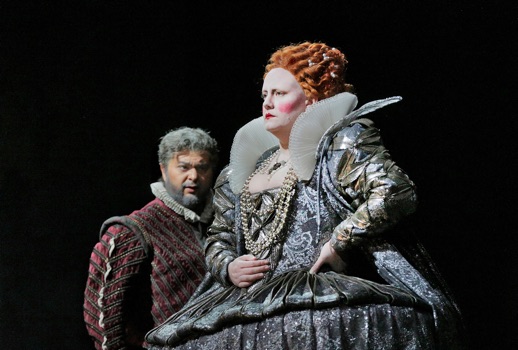
The guiding hand of director David McVicar supervising this revival could be felt in Radvanovsky’s quiet, focused fervor. Hers was a much more flesh-and-blood embodiment of the Stuart queen than Joyce DiDonato’s had been when the production was new. From her entrance DiDonato personified a chilly martyr where Radvanovsky incarnated a warmer, more vulnerable woman. Despite the awe-inspiring accomplishment of her bel canto technique, the mezzo’s smaller, whiter voice (along with many downward transpositions) lacked the visceral impact of her successor’s exciting, house-filling soprano.
Stuarda’s oddly bipartite structure means Elisabetta is nearly as important as Maria, and Elza van den Heever returned to the production repeating her strikingly kinetic interpretation of the Virgin Queen. McVicar devises a stark contrast between Elisabetta’s restless energy and Maria’s intent stillness, but van den Heever’s manic limping and darting about the stage soon grew wearisome. While one admired the soprano’s all-out physical commitment (although no head-shaving this time), less frenetic choices might have been more effective.
So too van den Heever’s bright pointed soprano squared off vividly against Radvanovsky’s warmer, more enveloping sound. As it had two seasons ago, Van den Heever’s singing again proved erratic and puzzling; sometimes the voice responded fully and confidently, other times it emerged small and hollow. The top seemed pinched at one moment, free and pealing at others.
She spun the opening cavatina with a sweetly light touch but the succeeding cabaletta lacked the needed thrust. Her waspish, biting edge served the character well but I’m curious to hear the South African soprano in another sort of role and look forward to her Fidelio Leonore this summer at the Caramoor Festival under Pablo Heras-Casado.

As Maria’s devoted Talbot, Kwangchul Youn started out in alarmingly unsteady voice but settled down to a hearty if anonymous portrayal. By contrast, Patrick Carfizzi delivered a powerfully sonorous Cecil and again made one wonder why one doesn’t encounter this consistently excellent, under-valued artist more often at the Met. While Maria Zifchak limned a touchingly faithful Anna, her mezzo grows more grating on each hearing.
John Macfarlane’s arrestingly abstract sets and sumptuous costumes helped McVicar to create one of his more effective Met productions, despite the distracting hyper-active stage business for Elisabetta. The numerous duets, trios and ensembles were handsomely and economically staged, and Jennifer Tipton’s evocative lighting again reminded me how rarely the Met has seen the work of this superb artist.
Conductor Riccardo Frizza’s fine work was likely responsible for the superiority of this Stuarda over last fall’s Bolena. Unlike the well-intentioned but uninspiring Marco Armiliato, Frizza led a taut performance, attentive to his singers and crackling with energy.
Frizza’s dynamism surpassed Maurizio Benini’s two years ago, and it’s too bad that he won’t be leading the final work in the so-called “Tudor Ring”—the new McVicar Roberto Devereux which opens on March 24—it’ll be Benini again. But Radvanovsky’s gratifying development as a Donizettian raises high hopes for this Met premiere whose glamorous cast includes Elina Garanca, Matthew Polenzani and Mariusz Kwiecien.
Photos by Ken Howard/Metropolitan Opera.














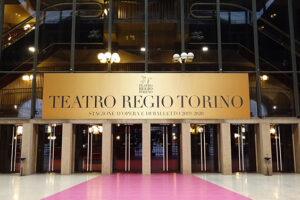
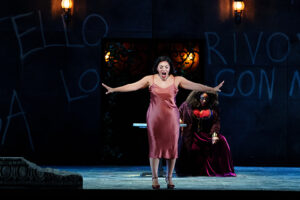
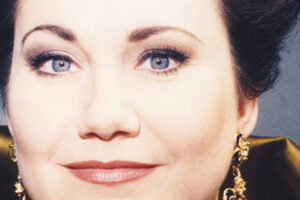
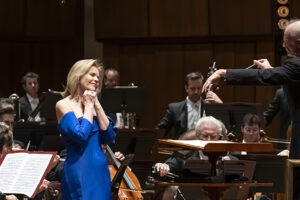






Comments